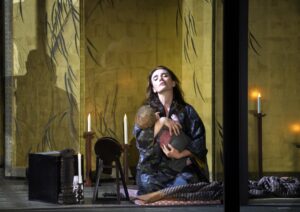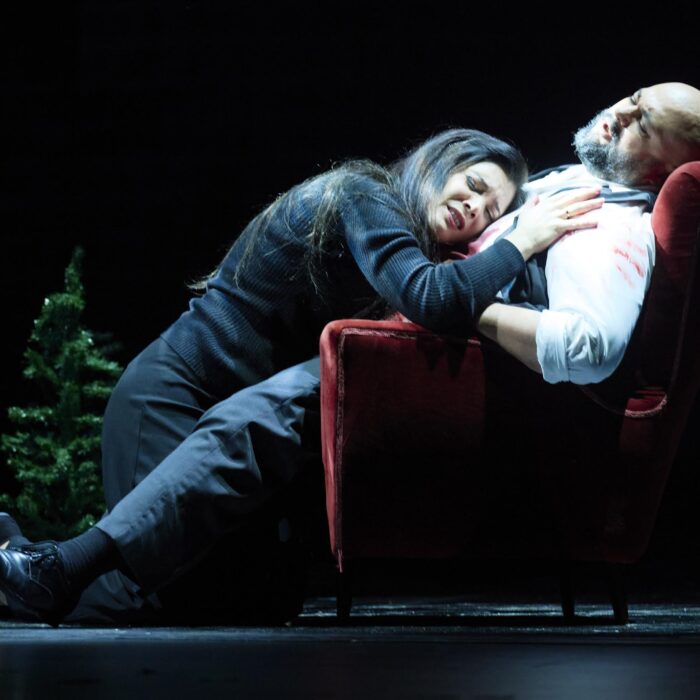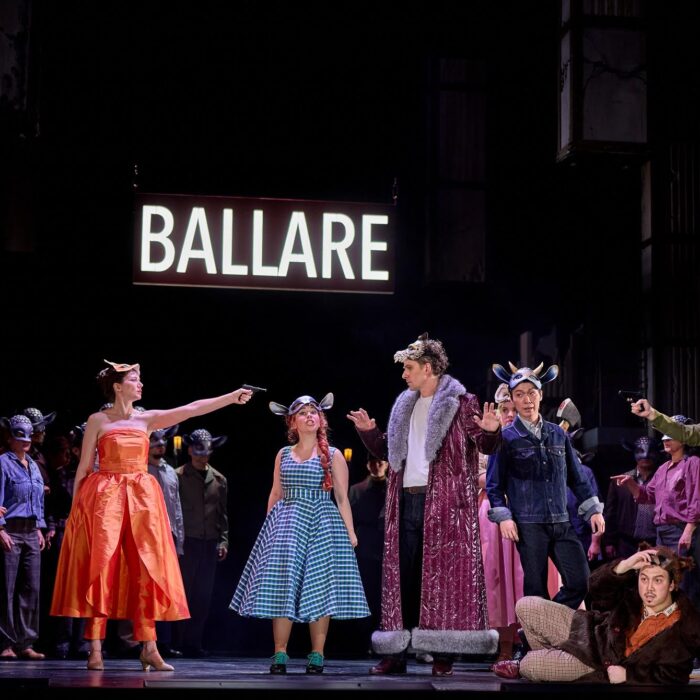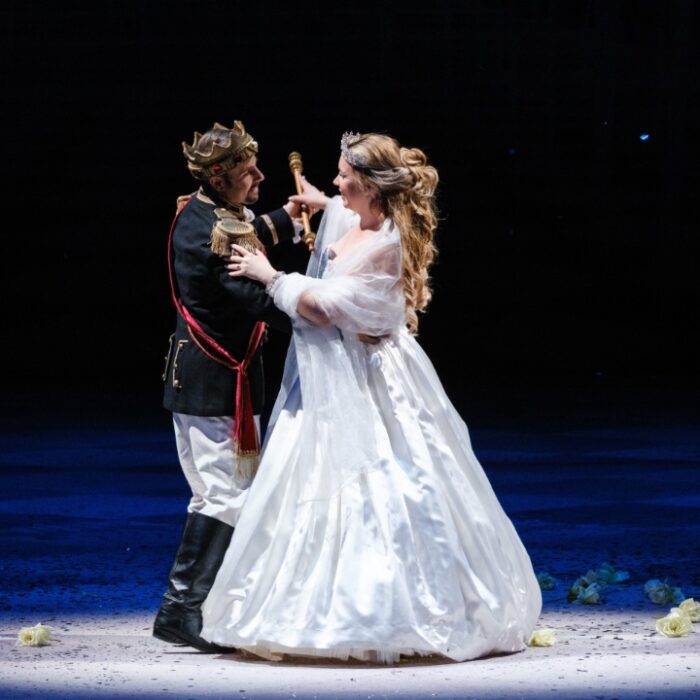
Festival d’Aix-en-Provence 2024 Review: Madama Butterfly
By João Marcos Copertino(Photo credit: © Ruth Walz)
Puccini in Aix-en-Provence is not an obvious combination, and it was not until 2019 with Christophe Honoré’s “Tosca” production that Lucca’s maestro made his debut in the festival. It was an ultra-revisionist “Tosca”: two primissime donne on the stage, several videoclips, and many other bold choices. It was glorious and thought-provoking. Therefore, expectations for a “Madama Butterfly” were sky-high. If “Tosca”—an arguably less controversial opera—got such a dramatic reading, what would happen to the doomed tale of a Geisha and American Imperialism? Surprisingly enough, the production was underwhelming, unexciting and often derivative.
Production Details
Stage director Andrea Berth said “Butterfly” is a terrible story, but very easy to tell; she planned not to overburden operagoers with interpretations. The problem is that she forgot that there is no staging without an interpretation (even a Zefirelli production is an act of interpretation). Even worse, Puccini has perhaps rarely felt so dull and un-dramatic.
The staging took place inside a small box—emulating a Japanese traditional house. Surrounding the inner-stage, there is a conveyor belt which characters and other figures used to enter and leave the stage. The resemblance to a Kaitenzushi restaurant was uncanny. Nevertheless, unlike Japanese theater or restaurants, the stage movements were mostly devoid of any graciousness and aestheticism. I saw the show a few nights after the premiere, and there were many mechanical problems: Cio Cio San’s kimono stuck in the midst of her glorious entry; unsynchronized puppeteers; and confusing entries of characters. Even worse, everything seemed derivative of productions that I have seen before—from my first “Butterfly” in Provincial São Paulo to Minghella’s Met spectacle.
The disregard for originality—and for any attention to the score or even to Noh theater, one of Berth’s references—weakened the presentation of the drama. On a surface level, there was an almost complete disregard for gestures. With a few exceptions in the movements of Ermonela Jaho or Mihoko Fujimura, the night could have been a concert performance. Ignoring the movement on the stage to such a degree undermined all the possible effects of beauty and escapism that some find in Puccini’s work.
The lack of “interpretation” also goes against the grain of “Butterfly’s” conception. Puccini might have cared very little about Japanese people or imperialism, but we have in writing that he was invested in the contemporaneity of Butterfly’s drama. His orientalism might be uncomfortable to watch, but it comes with bitter drops of criticism of certain American behaviors. Some could not bear even such oblique condemnation: former Met boss Joseph Volpe confessed that he forbade any staging of the opera with a drunk, chain-smoking soldier (it would be “anti-American” in his mind). Anti-American or not, Pinkerton is not an ideal American; only Minnie is that.
Part of the problem of Butterfly’s orientalism is that the pictorial beauty is forever linked with a vaguely subliminal consciousness that all beautiful things are being destroyed by westerners’ gaze and desire. The passivity of Butterfly, handing her son over and killing herself, though an emblematic moment in opera, is questionable. Still, even the least “interpretative” productions need to address real beauty and aesthetics, and real suffering and destruction. Berth could not deliver any of these. The sloppy movements and low-grade criticism made this “Butterfly” as forgettable as 2019’s “Tosca” was remarkable. The issue is: when dealing with Puccini in the most avant-garde opera festival, the stakes are high—especially when dealing with a composer who understood drama so well.
Musical Highlights
The uninventiveness of the Berth’s dramatic reading greatly affected the musical performance. Culpably understood here as separate elements, staging and music often walk together, especially in Puccini. I have often committed the sin of safeguarding a performer in a lesser staging, but truth be told, it is sometimes hard to discriminate one from the other. In this case in particular, the main problem was that the staging’s concept disregarded the physicality and assets of its musical cast.
Let’s start with the night’s diva, Ermonela Jaho. She is a visceral singer. It is emblematic—and a bit campy—the way she always faces her curtain calls as if she might not survive to the end of them. Her representation of exhaustion—and its drastic delivery—is part of what makes her so well-beloved by her fans. That and the fact that I do not know any singer nowadays who can die as dramatically on stage as she does (especially in “Traviata”).
The production seemed to neglect most of Jaho’s dramatic capabilities, especially in regards to her signature over-the-top physicality. She did everything, and we all witnessed her greatness in the always excruciatingly painful third act, but it was all done in spite of the staging. Moreover, Jaho is a mature woman now, Berth seemed to not recognize that. It is not a matter of make-up or faking age, but rather that, with most Butterflies being sopranos in the prime of their careers, the theatrical qualities that led them to such pivotal careers in the first place cannot be overblown.
Nevertheless, even with a slightly wider vibrato, Jaho is still the most drastic performer. I am always impressed by how she manages a decoupage of the text, showing a blend of layers and showcasing the most sublime pianissimi. Let’s take for example her “Un bel dì”: with an attack that was beyond perfect in the first note, she shone when she managed to sing smoothly, with perfect command of Italian consonants. Her voice, though quiet, is unforgettable—confessional, reflective, and expressive. Her level of musical attentiveness is rare, and Jaho seems to have it mastered.
It might just be the election year, but Adam Smith has never looked more like Donald Trump Jr. than he did the other night. Doppelganger aside, the British tenor has a very beautiful spinto tone and decent Italian, but he struggled to convey a solid portrait of Pinkerton. At the beginning of the night, he clearly struggled singing the high notes in “America Forever” without cracking—it is normal, it takes a bit for the voice to warm up. Nevertheless, his legato was significantly problematic, showing a bit of inconsistency in the tuning. Berth’s staging did not help either: there was no sexual tension or seduction (musically or visually) at the end of the first act—a pity.
Mihoko Fujimura was perhaps a more discreet Suzuki than is usual. The Japanese mezzo-soprano has a well-established career singing Germanic repertoire, but I fear her Suzuki is a bit off in regards to her dramatic and vocal skills. Her voice, usually so sweet and maternal, even sounded weak during some moments of the night. Yet her physicality was extremely gracious, distinguishing her from most of the cast. Her first entry, her bafflement looking at Pinkerton’s feet, and even her handling of the doll Baby reminded me of a certain kind of theater that otherwise was simply not there.
Lionel Lhote was a sonorous Sharpless. The character has that passive complicity with Pinkerton’s patriarch; still, his is the only one who shows some hitch of humanity.
The minor roles were all solidly performed—with special attention to Albane Carrère’s Kate Pinkerton. She eerily conveyed disdain for Butterfly while usurping her place as a mother.
The Lyon Opera Orchestra performed well under the attentive hands of Daniele Rustioni.
Aix’s “Butterfly” does land off the ground. It will no doubt have pleased some inert intellectual spirits, but in the end, it was a frustrating experience for almost everyone seeking Puccini’s theater. Despite its soprano’s efforts, that drastic dramatic urgency, the little shockers, the ex-machina, everything—was just not there. It is not easy to stage “Butterfly,” and I understand one’s effort to avoid debating race and colonialism in one of Puccini’s most beloved operas. However, one cannot escape Puccini’s theater, much less his strong musical spirit, which demands theatrical braveness.


